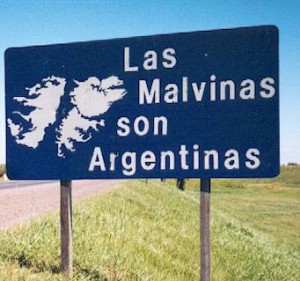EspañolAll means of public transport in Argentina are now legally obliged to bear the words “Las Islas Malvinas son Argentinas” (The Falkland Islands are Argentinean), according to a law published on January 2 in the government’s Official Bulletin.
The new legislation, passed in November 2014, aims to highlight the Argentinean government’s claim to sovereignty over the South Atlantic archipelago, currently under the control of the United Kingdom.
With the provisions having come into force, all public transport vehicles operating within and outside of the country must now display the message in a “visible and prominent place,” although the precise format is yet to be stipulated. Departure and arrival stations are also required to put up signs bearing the text.
The measure applies to “public transport for passengers on streets, avenues and highways, and transport via rail, river, lake, sea, or air,” with responsibility for the “maintenance and protection” of the placards falling upon transport companies, according to the law.

All Aboard the Nationalism Bandwagon?
Daniel Bertti, a veteran of the armed conflict that took place between Argentina and the United Kingdom over the islands in 1982, and a survivor of the sinking of the cruiser General Belgrano, told the PanAm Post that the legislation was “great news.”
“This helps keep fresh the desire of the majority of Argentineans: to recover the Falklands. The Falklands were stolen; they’re Argentinean,” he said.
Nevertheless, for Argentinean journalist and author José Benegas, the law represents “nationalism by slogan” and a “poor-quality fiction.”
“While transport in Argentina carries this slogan, transport in the Falklands is still English,” he told the PanAm Post.
“First, we need to recover the islands from history. We need to leave them in peace. It’s one thing to yearn for a lost cause, and another to pine after it in the most imbecilic way imaginable: by painting statements on a bus,” Benegas argued.
Patagonian Scandal
The issue of the islands’ sovereignty is a recurring theme in Argentinean politics. Every April 2, the anniversary of Argentinean invasion of the island, the issue reaches fever pitch and dominates media headlines and political discussion. Most recently, the filming of a special episode of the British Broadcast Corporation (BBC) show Top Gear in Argentinean Patagonia revived tensions and nationalist sentiment.
The December 27 and 28 screening of the two-part Christmas special of the automobile-themed show, filmed three months ago in the extreme south of the continent, was mired in controversy over the alleged allusion to the Falklands War made by the license plates of vehicles used in the production.
Tonight on BBC2, some men are nice about Argentina. Tomorrow night, they throw rocks at us.
— Jeremy Clarkson (@JeremyClarkson) December 27, 2014
Violent reactions were provoked in particular by the registration of a Porsche 928 as “H982 FKL,” which some alleged was a thinly-veiled reference to the 1982 war that left over 900 dead and thousands more injured.
Local authorities in Ushuaia, capital of the southern province of Tierra del Fuego where filming partly look place, protested against the show. Officials said they were “appalled at the suspicious and provocative attitude” shown by the program, which is the most-viewed factual television program in the world.
“These people have only come here to disrespect the memory of our fallen in the Falklands, and we cannot allow this,” argued one local legislator.
Also raising eyebrows were the Ford Lotus and Mustang used by presenters, which bore license numbers similar to the figures of Argentinean and British soldiers that lost their lives during the 74-day conflict.
Andy Wilman, executive producer of the program, denied that the license plates used were a “stunt,” and presenter Jeremy Clarkson said he was in “shock” over the hostile response the production team received.

“Government officials stepped in saying we were no longer welcome in the city, that our safety could not be guaranteed and that we needed to leave Argentina immediately,” wrote Clarkson. “Plainly they had given us permission to visit simply so they could make political capital from ejecting us when we arrived.”
For Bertti, the episode was a “useless provocation,” but he didn’t believe that the alleged misstep by the TV show “represented the will of the majority of the British people.”
“It was a provocation that began as a joke, which was completely out of place,” he added.
Nevertheless, the backlash reached the highest levels of diplomacy. Argentina’s ambassador to the United Kingdom, Alicia Castro, issued a formal complaint against the BBC and called for a public apology.
Castro accused the program of being “provocative, biased and insulting,” and failing to observe its own guidelines on filming abroad. The ambassador also criticized the corporation’s failure to “appropriately manage” complaints made over subsequent comments issued by Clarkson.
In all seriousness, I would like to thank the people and government of Chile for their help and support when everything went wrong.
— Jeremy Clarkson (@JeremyClarkson) December 29, 2014
Following a demonstration against the filming of the program in the city of Tolhuin, Tierra del Fuego, the Top Gear production team fled the region with local inhabitants in hot pursuit. Protesters blocked roads and threw stones at their vehicles, injuring two members of the BBC crew, who eventually took refuge across the border in neighboring Chile.
Translated by Laurie Blair. Edited by Guillermo Jimenez.
 Versión Español
Versión Español












